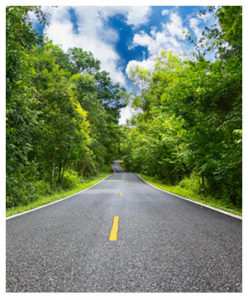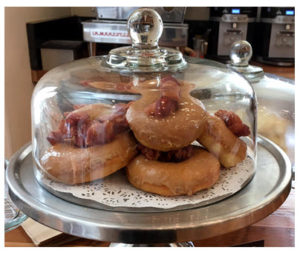Large trees are snapped in two. Uprooted trunks dwarf my car as I slow to look. Beyond the shoulder of the road and low growth lies an unnatural clearing of downed limbs and branches that crisscross like pick-up sticks. This is where a tornado touched down, here in these woods, not far from where I am staying.
 Forces we cannot control can flatten us. Cleanup always takes time.
Forces we cannot control can flatten us. Cleanup always takes time.
*
Getting off the island. This is how I’ve put it in the past. Getting off the island is a nod to the instinct to be among people, conversation, the activity of daily life whether we are only observing or, instead, placing ourselves deep in the heart of its bustling, rambunctious spontaneity.
Even in observing, we are, of course, participating.
Getting out into the world can become tedious, burdensome even. This is especially true when we feel wounded or shut down, when we lose the habit of pushing beyond the familiar, when we buttress ourselves behind barriers, when we refuse to look beyond the small spheres we carve out, cordon off, provision, decorate, heat, cool, and imagine to be safe from outside influences we would rather not face.
Getting out isn’t a new concept, a new subject, or a new need in my life. As I grow older, I have more difficulty getting off the island. And the consequence, as I’ve known for some time, is a narrowing universe.
*
While I know who I am in the silence and admit to craving it when I’m pressed to do without, I lose myself just a bit if immersed in its cocoon for too long. When I finally venture out, I’m fully aware of impairments, holes, rust. I become an untuned piano, a pitted roadway, a door with hinges in need of oil.
So I remind myself we are all in need of repair at one time or another and I persist — even if I hear myself chatter a little too much, wondering if I’m saying the right thing or the wrong thing, or the right thing in the wrong way, or the wrong thing in the wrong way. How often we are uncertain when to fill the silence and when to appreciate its eloquence.
*
There are reasons for isolation. We choose it expressly or slide into it unwittingly. In my lifetime, I have done both.
I cannot deny the obvious litany of relevant facts, evidence I place before myself as reasons rather than excuses. There was moving to a new place where I am entirely on my own. There were injuries within weeks of my relocation. There was my inability to do what we take for granted until we can no longer do it — bathing myself, dressing myself, maneuvering up and down stairs, climbing in and out of a bed, sleeping for more than two hours at a time.
For days I may not speak and it is fine. For days I may not speak and the silence is oppressive.
*
Some mornings I write from coffee, happily and with purpose. Some mornings I write from dream, still foggy and clinging to voices and places I know, and others I do not. Some mornings I write from an image that catches my fancy: a child playing in a puddle, a juicy burger and fries, a meadow of wildflowers, a woman in a coffee shop, hands clasped in unity. In these moments, I can splash in the cool of the puddle and giggle, bite into the burger and lick ketchup off my lip, run through black-eyed Susans and bellflowers and Queen Anne’s lace, sip an espresso on the streets of Paris. I can revisit the tender, curious, mischievous, glorious rainbow faces of my children’s friends.
 Some mornings I write from nothing, of nothing, feeling like nothing, hoping the emptiness of the page and the mechanical action of a trained arm will drag something from my nothing that may, in looking back, serve a purpose greater than filling time.
Some mornings I write from nothing, of nothing, feeling like nothing, hoping the emptiness of the page and the mechanical action of a trained arm will drag something from my nothing that may, in looking back, serve a purpose greater than filling time.
Perhaps this is Hanon, necessary discipline, the flurry of fingertips traveling the keys.
*
Braving the morning after a stormy night: First, it is impossible. Then you tell yourself, this isn’t so hard, the doing of it, once you take a breath and dig in.
Bathing still takes longer and I’m frustrated. Dressing still takes longer and it’s tiring. Dealing with the stairs, wriggling behind the wheel of the car, managing the seat belt with impaired shoulders and arms and lower back; these, too, test my patience and my mood, so in getting out, I try to dismiss the details of the process in order to engage in the process. Bodies break down, but I have fought more damaging breakage than this. And always, eventually, I find my way.
*
In the first 10 minutes, I cruise along a familiar route, dull and homogeneous. In the next 10 minutes, I am passing under the shaded, leafy canopy of country road where downed trees and debris are only partially brushed to the edge of the woods. Apparently, this is only one of the spots where the twister touched down. Suddenly, I am startled by the sudden opening onto a glistening, verdant landscape dotted with the occasional farmhouse, silo, paddock. I am new to the countryside, accustomed to city noise and navigating urban corridors. I confess to a smidgen of panic if I find myself in unfamiliar and open terrain for too long.
In another 10 minutes, I am cruising at 25 miles per hour through a picture-perfect postcard of a town, its abbreviated stretch of pristine clapboard houses, one coffee shop, a vintage store or two designed for the tourist trade, a bakery (well known, I am told), one pricey restaurant, and a few more commercial establishments with charming storefronts.
I need to slow down. I need to stop, park, and explore.
*
I see what appears to be a gathering spot — part casual restaurant, part coffee shop, part retailer of local farm fresh produce.
As soon as I enter, I’m struck by the bright, airy interior and the colorful array of foods displayed in gleaming cases. The meat counter offers chops, shanks, ribs, roasts, filets, ground beef. The bakery display is especially enticing: mini-cheesecakes, flourless brownies, apple crumbles, homemade donuts.
 A lovely moment: an impromptu chat with the jovial middle-aged man behind the cash register who responds to my questions about risotto cakes, veggie pasties, scotch eggs.
A lovely moment: an impromptu chat with the jovial middle-aged man behind the cash register who responds to my questions about risotto cakes, veggie pasties, scotch eggs.
Strangers come together easily over small nothings — which coffee to choose, which muffin is sweeter, is that maple icing on the scone, what on earth is a “Scotch” egg.
*
As I make my way back through open farmland, it is less ominous. As I pass through the tunnel of trees and survey the storm damage from the other side of the road, I note the lush thicket of woods that is entirely untouched. As I return to a segment of highway that is comforting simply because it is known, I notice my fatigue. I’m even more worn as I pull into the driveway, haul myself up 13 stairs to the front door, let myself in, trudge up five more steps to the main floor, kick off my shoes, and drop into a big, welcoming sitting chair.
I flip the switch on one heating pad to position behind my lower back and another to hold across the shoulder that is aching. I turn on the news.
Charlottesville. Racial violence in Charlottesville. The shocking, despicable, ugly reality of mob-think, “otherizing,” hatred. And later in the day, the dismay and disappointment at those who will not wield the power of naming the angels that uplift us and the demons that would stamp them out.
The test of moral courage. The tragedy of moral cowardice.
Language is political. We must know our nouns. We must use them bravely. These are times for precision, not ambiguity.
*
Broken branches, snapped tree trunks, scarred earth.
Fear. We all know the fear of being alone, the fear of venturing out, the fear inherent in the journey. We all know relief in any destination that feels safe, though we’re foolish if we don’t open our eyes to the reality of where we land.
There is surprise when we get out, gain perspective, connect. Captured in my mind’s eye: a magnificent canopy of leaves, an emerald landscape, a conversation about nothing much that is just enough to make me smile.
I am out of the habit of “practice” writing — the act of closing one’s eyes and simply letting the words flow or, as Natalie Goldberg would put it, “writing down the bones.” This morning felt like a moment for returning to that practice, unguarded.
You May Also Enjoy
A moving read, DA, thank you.
D.A.,
I very much did like this style of writing for you. I noticed that there was not one question. While reading it, I felt like I was in the passenger seat right next to you observing via your eyes and thoughts.
I did become a bit confused on this: “Fear. We all know the fear of being alone, the fear of venturing out, the fear inherent in the journey. We all know relief in any destination that feels safe, though we’re foolish if we don’t open our eyes to the reality of where we land.”
What do you mean by: “we’re foolish if we don’t open our eyes to the reality of where we land.”?
I’ve played Hanon (though I cannot see the discipline as necessary), read the Goldberg and am newly alone so I’m with you. Though I don’t have your pain and I really feel for you on this. I wish you respite and relief. For me, writing is both hope and despair, self-muster (though I have to wonder at what is mustered…) and perhaps thankfully, an indulgence that can rarely be permitted. I am not sure it matters at all. But it helps us be and, very much in your case, be with. Us. Do you feel that?